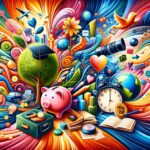
Are you ready to take your sleep game to the next level? If you’re struggling with sleep issues or just want to optimize your rest, advanced sleep strategies might be exactly what you need. This guide dives into the latest techniques and technologies designed to enhance your sleep quality and help you wake up feeling refreshed and energized.
Use of Sleep Aids
Sleep aids can be a helpful tool for improving sleep, but they should be used wisely.
Types of Sleep Aids:
- Prescription Medications: These include drugs like Ambien or Lunesta, which are designed for short-term use. Always consult with a healthcare provider before starting any prescription sleep aid.
- Over-the-Counter (OTC) Options: Medications such as Benadryl or Melatonin supplements can help some people fall asleep faster. However, they should be used sparingly and only after discussing with your doctor.
Tip: Relying solely on sleep aids isn’t a long-term solution. Combine their use with behavioral changes for more sustainable results.
Behavioral Sleep Therapy
Behavioral sleep therapy focuses on changing habits and thoughts that affect sleep.
Key Techniques:
- Cognitive Behavioral Therapy for Insomnia (CBT-I): This structured program helps you identify and replace thoughts and behaviors that hinder sleep.
- Sleep Restriction Therapy: Limiting time in bed to increase sleep efficiency.
Tip: Consider working with a sleep therapist to tailor these techniques to your specific needs.
Biohacking Sleep
Biohacking involves using technology and lifestyle changes to enhance your body’s performance, including sleep.
Popular Biohacking Techniques:
- Tracking Devices: Wearable devices that monitor sleep patterns, heart rate, and movement to provide insights for improvement.
- Light Therapy: Using bright light exposure in the morning to regulate your circadian rhythm.
Tip: Use biohacking tools to gather data and make informed adjustments to your sleep routine.
Custom Sleep Solutions
Custom sleep solutions are designed to meet individual needs and preferences.
Examples of Custom Solutions:
- Personalized Sleep Plans: Created by sleep experts to address your unique sleep patterns and problems.
- Customizable Bedding: Adjustable pillows and mattresses that cater to your sleep position and comfort preferences.
Tip: Seek out sleep consultants or specialists who can develop a tailored plan just for you.
Professional Sleep Studies
Sometimes, a sleep study is necessary to diagnose and address underlying issues.
Types of Sleep Studies:
- Polysomnography: A comprehensive test that monitors brain waves, oxygen levels, heart rate, and more during sleep.
- Home Sleep Apnea Testing: A simpler test done at home to diagnose sleep apnea.
Tip: Consult with a sleep specialist if you suspect a serious sleep disorder like sleep apnea.
Innovative Sleep Technologies
The field of sleep technology is rapidly advancing, offering new ways to enhance rest.
Cutting-Edge Technologies:
- Smart Mattresses: Mattresses that adjust firmness and temperature based on your sleep patterns.
- Sleep Monitoring Gadgets: Devices that provide real-time feedback on your sleep stages and environment.
Tip: Explore the latest sleep tech options and choose those that best fit your sleep needs.
Sleep Enhancement Through Lifestyle Changes
Lifestyle changes can profoundly impact your sleep quality.
Effective Changes:
- Regular Exercise: Engaging in physical activity during the day helps you fall asleep faster and enjoy deeper sleep.
- Mindfulness and Relaxation Techniques: Practices like meditation or deep breathing can reduce stress and improve sleep.
Tip: Integrate lifestyle changes gradually and consistently for the best results.
Therapeutic Sleep Techniques
Therapeutic techniques aim to address specific sleep-related issues.
Common Techniques:
- Breathing Exercises: Techniques such as the 4-7-8 method can help calm your mind and prepare your body for sleep.
- Progressive Muscle Relaxation: Tensing and then relaxing different muscle groups to relieve physical tension.
Tip: Experiment with different therapeutic methods to find what works best for you.
Cutting-Edge Sleep Research
Stay informed about the latest sleep research to understand new ways to improve your rest.
Current Research Focuses:
- Genetics and Sleep: Studies on how genetic factors influence sleep patterns and needs.
- Sleep and Mental Health: Research exploring the connection between sleep and various mental health conditions.
Tip: Follow reputable sleep research organizations and journals for updates on emerging findings.
Advanced Sleep Monitoring Tools
Advanced tools offer detailed insights into your sleep patterns and help identify areas for improvement.
Examples of Monitoring Tools:
- Sleep Trackers: Devices that measure sleep duration, quality, and interruptions.
- Sleep Environment Monitors: Gadgets that track factors like room temperature, humidity, and noise levels.
Tip: Use these tools to monitor your sleep over time and make data-driven adjustments to your routine.
Personalized Sleep Plans
A personalized sleep plan is tailored to your specific sleep needs and goals.
Components of a Personalized Plan:
- Customized Sleep Schedule: Recommendations for when to go to bed and wake up based on your lifestyle and sleep patterns.
- Targeted Strategies: Specific techniques and tools designed to address your individual sleep issues.
Tip: Work with a sleep consultant to create and refine a personalized sleep plan.
Effective Sleep Disorders Management
Managing sleep disorders often requires a multi-faceted approach.
Management Strategies:
- Medication: Prescribed by a doctor for conditions like insomnia or sleep apnea.
- Behavioral Therapy: Techniques to address the root causes of sleep disorders.
Tip: Seek professional help for accurate diagnosis and effective management of sleep disorders.
Specialized Sleep Therapies
Specialized therapies address unique sleep challenges and disorders.
Examples of Specialized Therapies:
- Continuous Positive Airway Pressure (CPAP): Used for managing sleep apnea.
- Light Therapy: For conditions like Seasonal Affective Disorder (SAD) that affect sleep.
Tip: Explore different therapies and work with a specialist to find the best option for your situation.
Sleep Improvement Techniques
Overall, improving sleep often involves a combination of techniques and lifestyle changes.
Techniques to Try:
- Sleep Hygiene: Practices that promote good sleep, like maintaining a consistent sleep schedule and creating a relaxing bedtime routine.
- Cognitive Behavioral Therapy for Insomnia (CBT-I): Helps address negative thoughts and behaviors affecting sleep.
Tip: Implement these techniques gradually and track your progress to identify what works best for you.
Conclusion
Improving your sleep quality involves exploring a variety of advanced strategies and technologies. From using sleep aids and engaging in behavioral therapy to embracing cutting-edge sleep tech and personalized plans, there are numerous ways to enhance your rest. Start by incorporating the techniques that best fit your needs and consult with professionals if necessary. By staying informed and proactive, you can achieve the restful, restorative sleep you deserve.
For more detailed information, consider reaching out to sleep specialists or exploring additional resources on sleep improvement. Sweet dreams and restful nights await!









